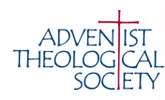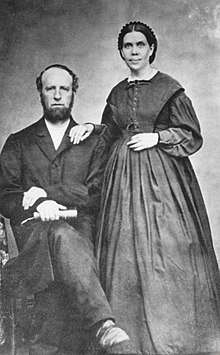Adventist Theological Society
The Adventist Theological Society (ATS) is an international nonprofit organization of Seventh-day Adventist scholars and lay-people. The society holds its annual meeting in connection with the Evangelical Theological Society. It describes its theology as "balanced and conservative Adventist theology".[1] The other main Adventist theological organization, the Adventist Society for Religious Studies is more liberal/progressive by comparison.

| Part of a series on |
| Seventh-day Adventist Church |
|---|
 |
|
|
|
Organization Divisions
|
|
| Adventism |
History
The society was organized in October 1988 at what is now Southern Adventist University, when a group of scholars broke off from the Andrews Society for Religious Studies, which is now the Adventist Society for Religious Studies (ASRS). The meeting consisted of four delegates from Andrews University and eight from Southern. Jack Blanco, author of The Clear Word, was elected president.
The first annual session was held at Wheaton College in November 1988.
In 1989 the society decided to publish the Journal of the Adventist Theological Society, with Leo Van Dolson as editor. C. Mervyn Maxwell and Gerhard Hasel were also actively involved with the journal. The first issue was published in 1990. Since 2009 Randall W. Younker has served as editor.
Membership consisted of 1400 individuals in 1994.[2] According to a 1996 article, its religion scholars are predominantly from the Seventh-day Adventist Theological Seminary at Andrews University, Southern Adventist University, and the Biblical Research Institute, plus around 1,700 lay people.[3]
President
The following is a chronological list of those who have served as presidents of the ATS:
- Jack Blanco 1988-1990
- Gerhard Hasel 1990-1992 (deceased)
- C. Raymond Holmes 1992-1994
- E. Edward Zinke 1994-1996
- Richard M. Davidson[2] 1996-1998
- Norman Gulley 1998-2000
- Jo Ann Davidson 2000-2002
- Jiri Moskala 2002-2004
- Larry Lichtenwalter 2004-2006
- Ron Clouzet 2006-2008
- Roy Gane[4] 2008-2010
- Stephen Bauer 2010-2012
- Tom Shepherd 2012-2014
- Felix Cortez 2014-2016
- Carl Cosaert 2016-2018
- John Reeve 2018-2020
- Rahel Wells 2020-2022
ATS Chapters
• Northwest Chapter- founder and president, Jim Reinking 2012-2018
Publications
The organization publishes the Journal of the Adventist Theological Society (JATS), a referred scholarly journal issued twice a year from Berrien Springs, Michigan. It was first published in 1990.
It also publishes the Perspective Digest, an online publication, which contains popular level articles.
Constitution
According to its constitution, "The centrist focus of the Society places it against all forms of theological extremism, avoiding theological liberalism and legalistic or literalistic interpretations of the Scriptures." According to former Journal of the Adventist Theological Society editor Ed Christian,
- "The ATS is an organization of centrist Adventist biblical scholars who affirm the teaching and leadership of the Adventist church and covenant to study the Bible as believers rather than skeptics. Beyond that, members are free to hold and argue a variety of opinions. (For example, some ATS scholars favor the ordination of women, and some oppose it.) About forty ATS scholars are also members of the Adventist Society for Religious Studies (ASRS), so there is a good deal of overlap between the two groups, and I for one consider many ASRS scholars who are not ATS members as friends. Our aim is not to separate ourselves from supposedly “heretical” scholars, as some claim, but to have a forum where serious scholarship from our perspective can be shared and discussed."[5]
The Constitution has six components describing the society's name, mission statement, core values, goals, categories of membership, describes the society's Mission Statement, core values, goals and other items. Acceptance of the constitution, particularly the core values, is required to become a member of ATS.[6]
The core values are acceptance of the Bible, Christ as only savior of the world, and the fundamental beliefs, as well as the following doctrinal points (summarised):
- a. Christ's death on the cross was both an act of love and a substitutionary atonement.
- b. The Bible is the inspired, unerring, infallible Word of God.
- c. The historical-grammatical method of interpreting the Bible, as opposed to critical methods
- d. A literal reading of Genesis 1-11: six-day creation, Flood geology, and a young earth.
- e. The investigative judgment, historicist view of prophecy, and the year-day principle
- f. Ellen White's writings possess more than pastoral authority (see prophetic gift of Ellen White)
- g. The Seventh-day Adventist church is the remnant called to preach the three angels' messages of Revelation 14:6-13
- h. The society will support the church financially and through personal effort.
According to its website, "Membership in the Adventist Theological Society is open to any serious Bible student that recognizes the strength of working together to help touch Adventist leaders, pastors, theologians, and lay person with balanced and conservative Adventist theology on the cutting edge."[1]
See also
References
- "Membership :: Adventist Theological Society". Archived from the original on 2007-09-27. Retrieved 2007-05-22.
- "Adventist Theological Society" in Seventh-day Adventist Encyclopedia vol. 1, p.31-32
- Adventist Religion Scholars Meet | Adventist Today Archived September 22, 2007, at the Wayback Machine
- ATS Officers Archived 2011-07-21 at the Wayback Machine. ATS website, accessed March 2010
- The Adventist Theological Society Archived 2007-12-25 at the Wayback Machine, an interview of Ed Christian by John McLarty.
- http://www.atsjats.org/site/1/docs/ATSMembership.doc%5B%5D
External links
- Adventist Theological Society home page
- Journal Online Archive, to search for JATS articles
- About us
- Constitution - Mission Statement, core values, goals etc.
- Spangler, J. R. (1989). Adventist Theological Society. Ministry, December, 1989, pp. 24, 25.
- Articles relating to "Adventist Theological Society" as classified in the Seventh-day Adventist Periodical Index (SDAPI)